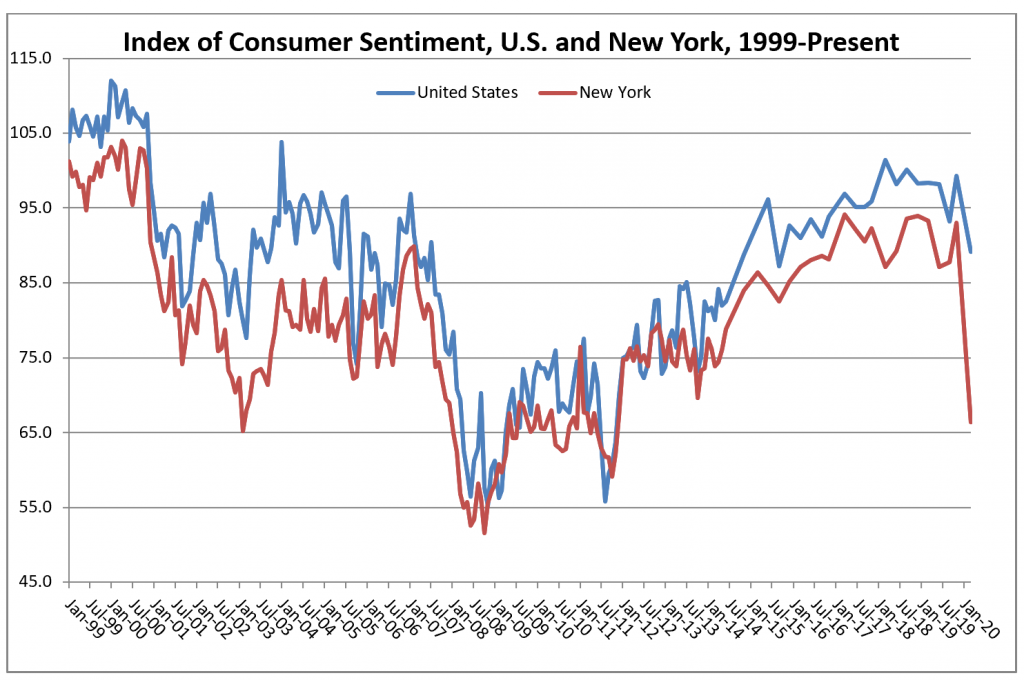- NY Consumer Sentiment Plummets as Coronavirus Hits
- Index Drops 27 Points, Lowest since November 2011
- Large Plurality Expect Bad Business Conditions Ahead; Majority say NOT Time to Buy
- As NY’ers Stay Home, Gas Worries Evaporate; All 6-Month Buying Plans Down
Press Release Summary Trends Buying Plans Gas and Food
Loudonville, NY – The New York State Index of Consumer Sentiment in the first quarter of 2020 stands at 66.4 down 26.6 points from the last measurement in the fourth quarter of 2019, according to the latest poll by the Siena College Research Institute (SCRI). New York’s overall Index of Consumer Sentiment is 22.7 points below the nation’s* Index of 89.1. All three indexes for New York are below their breakeven points at which optimism and pessimism balance for the first time since December 2011. The national indexes dropped but remain above the breakeven point.

“As the Coronavirus took hold of New York, consumer sentiment fell precipitously, signaled a sudden collective feeling of pessimism and reached a low not seen since 2011. A large plurality of consumers now think that the state’s business conditions this year as well as economic times over the coming five years are in trouble. Right now, 58 percent say that it is NOT a good time to buy major consumer items and plans to buy cars, electronics, furniture, homes and home improvements are down between 13 and 27 percent. In 20 years of tracking consumer sentiment in New York, we’ve seen more pessimism but never a drop this severe in this short of a time,” according to to Dr. Doug Lonnstrom, professor of statistics and finance at Siena College and SCRI Founding Director.
In the first quarter of 2020, buying plans were down, since the fourth quarter of 2019 measurement, for cars/trucks to 18.8% (from 21.6%), consumer electronics to 38.6% (from 52.4%), furniture to 24.2% (from 31.0%), homes at 8.1% (from 11.1%), and major home improvements to 19.0% (from 25.2%).
Twenty-seven percent (down from 41 percent) of all New Yorkers say that current gasoline prices are having a very serious or somewhat serious impact on their financial condition. Fifty-five percent (down from 58 percent) of state residents indicate that the amount of money they spend on groceries is having either a very serious or somewhat serious impact on their finances. Twenty-three percent of state residents say that both gasoline and food prices are having either a somewhat or very serious impact on their finances.

This Siena College Poll was conducted March 30-April 2, 2020 by random telephone calls to 402 New York adults via landline and cell phones and 400 responses drawn from a proprietary online panel of New Yorkers. Respondent sampling via phone was initiated by asking for the youngest person in the household. The overall results has an overall margin of error of +/- 3.6 percentage points including the design effects resulting from weighting when applied to buying plans and/or the perceived impacts of gas and food prices. As consumer sentiment is expressed as an index number developed after statistical calculations to a series of questions, “margin of error” does not apply to those indices. Telephone sampling was conducted via a stratified dual frame probability sample of landline and cell phone telephone numbers (both from ASDE Survey Sampler) from within New York State weighted to reflect known population patterns. Data from the telephone and web samples were blended and statistically adjusted by age, race/ethnicity and gender to ensure representativeness. The Siena College Research Institute, directed by Donald Levy, Ph.D., conducts political, economic, social and cultural research primarily in NYS. SCRI, an independent, non-partisan research institute, subscribes to the American Association of Public Opinion Research Code of Professional Ethics and Practices. For more information or comments, please call Dr. Doug Lonnstrom at 518-783-2362. Survey cross-tabulations and buying plans can be found at www.siena.edu/scri/cci.




